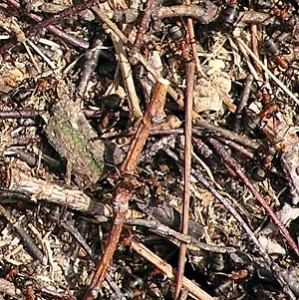Can I Compost Twigs, Sticks and Branches?
(From the Garden waste category | 2 comments - join the conversation) Yes, you can compost twigs, sticks and branches – but with some warnings.
Yes, you can compost twigs, sticks and branches – but with some warnings.
Anything woody – twigs, sticks, bits of bark – will rot down eventually but even twigs and sticks take a lot of time and can make it difficult to turn your compost heap in the meantime. If you want to add them, chop or break them up into small sections so they don’t get in the way and keep your compost nice and wet.
Any sticks or branches over a couple of centimetres (an inch or so) in diameter will even longer to break down – years and years if left in one piece (think how long it takes them to rot down in woodland etc). If you’ve got lots of big twigs or branches, it might be worth borrowing or hiring a wood chipper to break it down quickly – or use the resulting chippings for another purpose around the garden. (Big branches and logs can also be left in quiet parts of the garden to break down by themselves – they’ll become a home to all sorts of little creatures in the meantime.)
Don’t compost diseased wood or if it is riddled with problematic fungi, since the disease/spores might not be broken down by the composting cycle.







Do compost weeds grow again as weeds. Also plants that have quite a thick stem, can they be composted as they are or should they be cut up into small pieces.
waiting in anticipation,
Mike
I see it is a year since you asked your question, and that’s a long time to anticipate. Here’s my answer for you: Yes—Weeds, unless composted in a very high-heat compost will generally reseed themselves via your compost. Some weed seeds like high heat, too, and will survive even high heat.
My suggestion is that you never put weeds into your compost unless you know your compost is going to treat them to an extremely high dose of heat. Or, if you don’t mind the extra work, try putting only the parts of the weeds in that don’t carry the seeds.
I was taught to make my compost by adding plenty of green horse manure, along with kitchen scraps, yard green waste (leaves, vines), some paper waste, etc. Cover the pile with thick black plastic and keep it moist (not wet). Turn this pile every three days. At the end of 14 days you will have a lovely nutrient-rich compost to add to your garden.
If your compost pile isn’t steaming hot the first few times it is turned, it’s not heating up enough, and you may well be nurturing weed seeds.
As for thick-stemed plants, they will break down quite nicely, if you have enough heat in your compost pile/compost tumbler. Any thicker stems should be chopped o bits, as that will help the bio process.